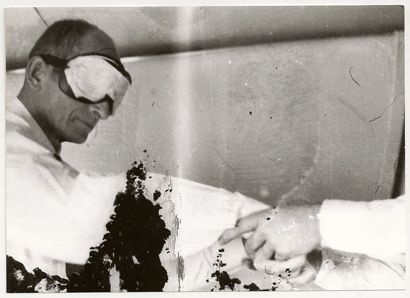
Adolf Eichmann, blindfolded before his departure to Israel. Image made by Zvi Aharoni, Mossad agent who found Eichmann in Argentina and participated in his abduction to Israel.
Al. Zvi Aharoni, Jerusalem, Israel
At four in the afternoon on 23 May 1960, Prime Minister David Ben-Gurion made a brief but stunning announcement to Israel's parliament, the Knesset. The wanted Nazi criminal Adolf Eichmann had been caught a few days earlier in Argentina, where he had been living in hiding, and brought to Jerusalem for trial. Thus began a milestone in the young State's history, which immediately took on a global dimension. After Nuremberg and the postwar purges that went on for nearly a decade in Europe, the Eichmann trial, which began on 11 April 1961, opened a new chapter in the judgment of Nazi crimes. This was the first case focusing solely on the extermination of the Jews. The controversial event, almost entirely filmed and copiously commented upon, and gave over 100 survivors a chance to speak about the horrors that had befallen them. It made remembrance of the Shoah a major public issue in Israel and Jewish communities worldwide even if that remembrance took on a universal dimension from the 1970s onwards.